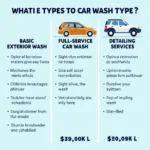A service loaner car, often simply called a “loaner,” is a vehicle provided to you by a dealership or repair shop while your own car is being serviced. This temporary replacement allows you to maintain your mobility while your car is undergoing repairs, maintenance, or bodywork. Having a loaner car can significantly reduce the inconvenience of being without your primary mode of transportation. This article will delve into everything you need to know about service loaner cars, from eligibility and insurance to the do’s and don’ts of driving one.
Are you wondering if it’s better to do car service from outside? You might find the answer helpful.
Understanding Service Loaner Cars
Loaner cars are typically offered for more extensive repairs or services that require your car to be kept overnight or for an extended period. They’re less common for quick services like oil changes or tire rotations. The availability of loaner cars also depends on the dealership or repair shop’s policy and the availability of vehicles in their loaner fleet. Some dealerships prioritize loaners for customers who purchased their vehicle there or those with extended warranties. Understanding the specifics of the service loaner agreement is crucial. This document outlines the terms and conditions of using the loaner car, including insurance responsibilities, mileage limits, fuel requirements, and any associated fees.
If you’re wondering how long a car service takes, we have a dedicated article on that topic.
Who Qualifies for a Service Loaner Car?
Eligibility for a service loaner can vary. Factors like the type of service being performed, your warranty coverage, and the dealership or repair shop’s policy all play a role. Some dealerships might require the repairs to be covered under warranty to provide a loaner. Others may offer loaner cars for a fee, regardless of the repair type. It’s always best to inquire about their loaner car policy when scheduling your service appointment. Also, your insurance coverage plays a significant role in determining your eligibility. Dealerships and repair shops need to ensure that you’re adequately insured to drive their vehicles.
Wondering if you should service your car at the dealership? We explore this question in detail.
Insurance Coverage and Loaner Cars
A critical aspect of using a loaner car is insurance coverage. Typically, your personal auto insurance policy will extend to cover the loaner vehicle. However, it’s essential to confirm this with your insurance provider before accepting the loaner. The dealership or repair shop will also likely have their own insurance policy that covers the vehicle. This policy usually acts as secondary coverage, meaning it will only come into effect if your personal insurance is insufficient.
Do’s and Don’ts of Driving a Service Loaner Car
When driving a loaner car, treat it with the same respect you would your own vehicle. Keep it clean, avoid reckless driving, and adhere to all traffic laws. Familiarize yourself with the car’s features and controls before driving off the lot. Report any existing damage or issues to the dealership immediately. Do not exceed any mileage restrictions or use the vehicle for unauthorized purposes. Returning the car on time with a full tank of gas (unless otherwise specified) is also important. Following these simple guidelines ensures a smooth and hassle-free loaner car experience.
Thinking about servicing your sports car elsewhere? Read our guide on where you can service sports cars.
What Happens if the Loaner Car is Damaged?
If the loaner car is damaged while in your possession, you’ll likely be responsible for the repairs. The extent of your liability depends on your insurance coverage and the terms outlined in the loaner car agreement. It’s crucial to report any accidents or damage to both the dealership and your insurance company as soon as possible.
Conclusion
A service loaner car bridges the transportation gap while your vehicle is being serviced. Understanding the intricacies of loaner car policies, insurance coverage, and the responsibilities involved ensures a convenient and stress-free experience. By following the do’s and don’ts of using a loaner car, you can maintain your mobility without any unnecessary hassles. Remember to always clarify any questions or concerns with the dealership or repair shop before accepting the loaner car. Knowing What Is A Service Loaner Car allows you to make informed decisions and enjoy a smoother car servicing experience.
FAQs
-
Are service loaner cars free? Sometimes. It depends on the dealership or repair shop’s policy.
-
Do I need my own insurance to drive a loaner car? Your personal insurance typically extends coverage, but it’s crucial to verify with your provider.
-
What type of car will I get as a loaner? The type of loaner car varies based on availability.
-
Can I drive a loaner car out of state? Generally, no, unless specifically permitted by the dealership.
-
What happens if I’m late returning the loaner car? Late returns may incur additional fees.
Need more assistance? Reach out to us via WhatsApp: +1(641)206-8880, or Email: [email protected]. Our customer service team is available 24/7.


